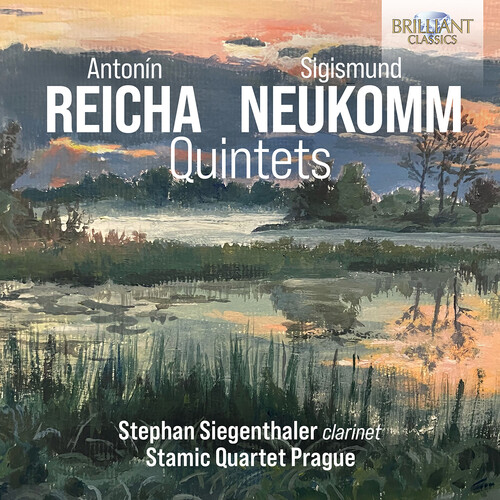Show results for
Deals
- 4K Ultra HD Sale
- Action Sale
- Alternative Rock Sale
- Anime sale
- Award Winners Sale
- Bear Family Sale
- Blu ray Sale
- Blues on Sale
- British Sale
- Classical Music Sale
- Comedy Music Sale
- Comedy Sale
- Country Sale
- Criterion Sale
- Electronic Music sale
- Fantasy Film and TV
- Folk Music Sale
- Hard Rock and Metal Sale
- Horror Sci fi Sale
- Jazz Sale
- Kids and Family Music sale
- Kids and Family Sale
- Metal Sale
- Music Video Sale
- Musicals on Sale
- Mystery Sale
- Naxos Label Sale
- Olive Films Sale
- Page to Screen Sale
- Paramount Sale
- Pop and Power Pop
- Rap and Hip Hop Sale
- Reggae Sale
- Rock and Pop Sale
- Rock Legends
- Soul Music Sale
- TV Sale
- TV Sale
- Vinyl on Sale
- War Films and Westerns on Sale

Quintets
- Format: CD
- Release Date: 2/16/2024

Quintets
- Format: CD
- Release Date: 2/16/2024
- Composers: Antonin Reicha, Sigismund Ritter von Neukomm
- Label: Brilliant Classics
- UPC: 5028421965963
- Item #: 2633472X
- Genre: Classical Artists
- Release Date: 2/16/2024

Product Notes
Antonín Reicha and Sigismund Neukomm were contemporaries. Their time in Vienna, where both were students of Joseph Haydn, crossed from 1802-04, and from 1810 until the end of their lives both had their permanent residence in Paris. It is therefore easy to imagine that their paths crossed several times. In common was their striving to preserve the style of Viennese Classicism, fully expressed in the works presented here. Antonín Reicha's (1770-1836) Quintet for Clarinet and String Quartet Op. 89 is typical of his balanced, classical style. Overall, the work reflects Reicha's affinity with opera. The harmonic turns are subordinated to the clarity of the vocal melody and the specifications of the form; everything has it's place and it's good order. Yet, in spite of this seemingly rigid formula there are surprising moments, for example the long syncopated melodic line at the beginning of the development in the first movement. The clarinet responds to the brash overture-like beginning of the opening theme with lyrically contrasting vocal garlands, whose motives are immediately imitated by the strings; an artfully counterpointing exchange between the instruments unfolds. What at first glance looks like the schematic application of well-learned compositional skill turns out on closer inspection (and repeated listening) to be a successful musical testimony to it's time with many hidden and sophisticated ideas. In Sigismund Neukomm's (1778-1858) Clarinet Quintet Op. 8, published in 1809, one can hear his desire to manifest admiration for his 'three-leaf clover' of influences: Haydn, Mozart and Beethoven. In it's entirety, Neukomm's Clarinet Quintet radiates more noble elegance than original innovation, and one can well imagine that this expression corresponded perfectly to the composer's own attitude to life.

